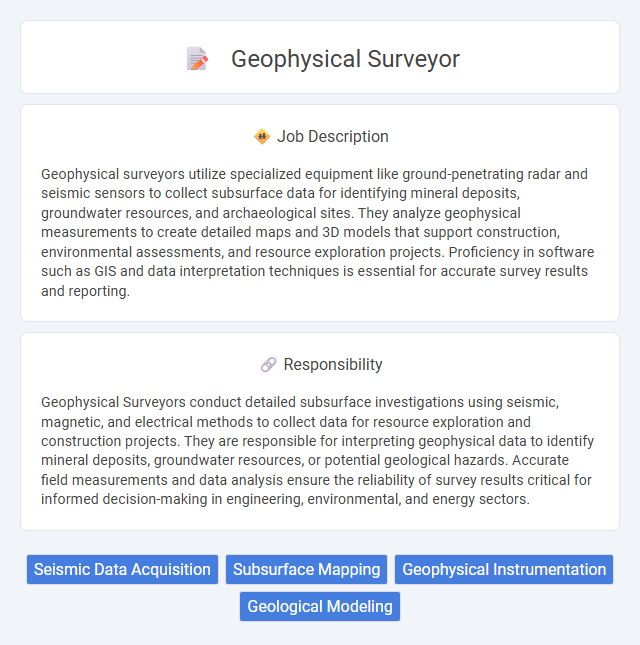
Geophysical surveyors utilize specialized equipment like ground-penetrating radar and seismic sensors to collect subsurface data for identifying mineral deposits, groundwater resources, and archaeological sites. They analyze geophysical measurements to create detailed maps and 3D models that support construction, environmental assessments, and resource exploration projects. Proficiency in software such as GIS and data interpretation techniques is essential for accurate survey results and reporting.
Individuals with strong analytical skills and a keen interest in earth sciences may find a geophysical surveyor role suitable, as the job often involves interpreting complex data and working outdoors in varying conditions. Candidates who are comfortable with physical activity and adaptable to sometimes remote or challenging environments are likely more aligned with the demands of the position. However, those who prefer sedentary work or consistent indoor settings might find this career less fitting for their preferences.
Qualification
A Geophysical Surveyor typically needs a bachelor's degree in geophysics, geology, environmental science, or a related field, with strong knowledge of seismic, magnetic, and gravity survey methods. Proficiency in data analysis software like GIS, MATLAB, or specialized geophysical tools is essential for accurate interpretation of survey results. Practical experience through internships or fieldwork, combined with strong analytical and problem-solving skills, significantly enhances job performance in this role.
Responsibility
Geophysical Surveyors conduct detailed subsurface investigations using seismic, magnetic, and electrical methods to collect data for resource exploration and construction projects. They are responsible for interpreting geophysical data to identify mineral deposits, groundwater resources, or potential geological hazards. Accurate field measurements and data analysis ensure the reliability of survey results critical for informed decision-making in engineering, environmental, and energy sectors.
Benefit
A geophysical surveyor likely experiences benefits such as high demand for specialized skills, which may lead to competitive salaries and job stability. Opportunities to work outdoors and travel to diverse locations can offer an enjoyable and dynamic work environment. Professional growth is probable due to advancements in geophysical technologies and continuous project variety.
Challenge
A Geophysical Surveyor may likely face challenges such as navigating difficult terrains and interpreting complex subsurface data accurately. The role probably demands adapting to unpredictable weather conditions and utilizing advanced equipment under pressure. Such challenges could require strong problem-solving skills and constant technical learning to ensure precise survey results.
Career Advancement
Geophysical Surveyors gain expertise in techniques such as seismic, magnetic, and resistivity surveys, which opens pathways to advanced roles like project manager or technical specialist. Mastery of data interpretation software and field equipment increases employability within the oil, gas, and environmental sectors. Continuous professional development and certifications enhance opportunities for leadership positions and involvement in complex geophysical projects.
Key Terms
Seismic Data Acquisition
Geophysical Surveyors specializing in seismic data acquisition operate advanced technology to collect subsurface data essential for oil, gas, and mineral exploration. They deploy seismic sensors and sources across survey areas to generate and record reflected seismic waves, ensuring data accuracy and spatial coverage. Proficiency in interpreting seismic signals and coordinating field logistics is critical to optimizing survey efficiency and data quality.
Subsurface Mapping
Geophysical surveyors specialize in subsurface mapping by utilizing advanced techniques such as seismic reflection, ground-penetrating radar (GPR), and electromagnetic surveys to detect underground structures and mineral deposits. Their expertise allows for accurate geological modeling and resource identification, critical for construction, environmental assessment, and exploration projects. Proficiency in data processing software and interpretation of geophysical data ensures effective decision-making in subsurface investigations.
Geophysical Instrumentation
Geophysical Surveyors specialize in deploying advanced geophysical instrumentation such as ground-penetrating radar, magnetometers, and seismic sensors to collect subsurface data for environmental, engineering, and exploration projects. Proficiency in calibrating and maintaining these instruments ensures accurate measurement of geological formations and resource deposits. Expertise in interpreting geophysical data enhances decision-making in site assessment, mineral exploration, and hazard evaluation.
Geological Modeling
A Geophysical Surveyor specializing in Geological Modeling analyzes subsurface data to create detailed 3D models of geological formations, enabling accurate assessment of mineral resources, groundwater, and geotechnical conditions. Proficiency in software such as GOCAD, Petrel, and Geosoft enhances the ability to interpret seismic, magnetic, and electrical survey data for precise stratigraphic and structural mapping. These models improve decision-making in resource exploration, environmental impact studies, and infrastructure development projects.
 kuljobs.com
kuljobs.com